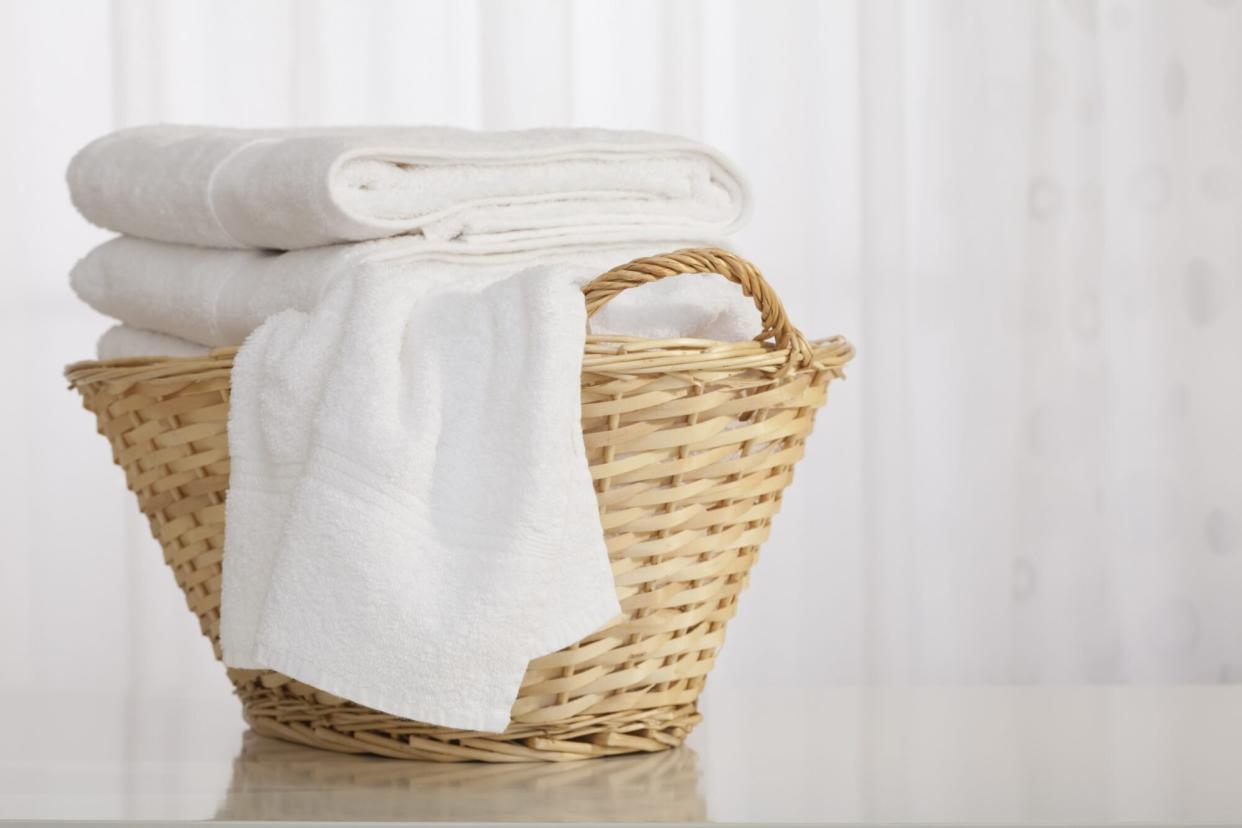5 Signs It's Time To Get New Towels

Getty Images
TABLE OF CONTENTS
On This Page
Signs It's Time To Get New Towels
How Frequently To Replace Towels
How Often To Wash Towels
What To Look for When Purchasing Towels
Just because your towels aren't falling apart with holes in them yet, doesn't mean you shouldn't invest in some new ones. Sometimes, though, it's hard to tell which towels you should turn into kitchen rags, and which ones are okay to keep using.
"Extending the life of your towels always starts with treating them with love," explains Janet Wischnia, founder of American Blossom Linens in Thomaston, Georgia. "You should always make sure to clean your towels because they tend to absorb a large amount of dirt and oil from bodies, and can harbor a lot of germs."
Signs It's Time to Get New Towels
They're scratchy
A lack of softness is a clear indicator that they're getting too old for use. "This can sometimes happen when they are washed with too much detergent," explains Wischnia.
They have an odor, even after washing
If your towels still have that musty smell even after washing them with detergent, this means they are beginning to absorb more germs than moisture and should be replaced.
They're no longer as absorbent
"If your towels are frequently dripping wet and no longer absorbing as much as they did initially, they are no longer serving their purpose and it is time for new ones," says Wischnia.
They're ripping and fraying at the ends
"This is a more obvious sign, but any kind of damage to the material means they need to be replaced," explains Wischnia. "This can lead to the towels no longer being absorbent."
You've had them for a few years
Over the years, general wear and tear can happen. "Depending on how many towels you have and how often you rotate them and their quality, the replacement time may change," says Wischnia.
How Frequently To Replace Towels
The frequency with which you replace your towels really depends on what you're using them for. "A good thing to remember is to replace bathroom towels every two to five years and kitchen towels and washcloths every year or every two years, depending on their quality," explains Wischnia.
How Often To Wash Towels
It varies depending on what, exactly, you're using your towels for. "For bathroom towels, they should be washed every 3-4 days, whereas kitchen towels need much more frequent cleaning," explains Wischnia. "A good thing to note is when they are washed, make sure to hang them dry instead of leaving them bunched up, as they can get musty."
What To Look for When Purchasing Towels
There are many factors to consider when on the hunt for new towels. Softer and more absorbent towels are heavier and thicker, and it's best to look at their grams per square meter (GSM) when shopping online, according to Wischnia. Towels with 300-400 GSM are usually light towels that dry quickly. Towels with 400-600 GSM are ideal for picnics or beach days, and towels with 600-900 GSM have a luxurious feel, are dense, are more absorbent, and take longer to dry.
You also want to consider size when purchasing new towels. "Standard bath towels from most retailers measure 27" x 52", while thicker and larger towels are 30" x 60"," explains Wischnia. "Hand towels measure 16" x 30" and washcloths range more around 13" x 13"."
Fiber is another important aspect when thinking about a towel's durability and absorbency. "Hotels and gyms often choose towels made of cotton/polyester, which is more durable and quicker to dry but less absorbent than just cotton," explains Wischnia. "Some people may be allergic to modal, which is not as durable as cotton or sustainable. Chemicals used to process bamboo may be harmful to human health and bamboo towels tend to shrink more than cotton."
According to Wischnia, the best ultra-absorbent towels are made of 100% organic cotton and have dense, fluffy yarn loops. "Organic cotton is naturally strong and soft and organic farming prohibits the use of synthetic chemicals and fertilizers," she says. "Therefore, toxic insecticides, herbicides, and defoliants are not used—organic cotton towels, which are OEKO-TEX ® CERTIFIED, are exceptionally absorbent, sustainable, have superior softness, and provide undeniable comfort."
It's important to make sure the edges are woven selvages or strong hems when purchasing new towels. "The ends of the towels should be neatly stitched, so the towel will be more resistant to fraying and will ultimately last longer," says Wischnia.Finally, with combed cotton towels, the fibers are combed to remove debris and short threads so that the strongest and longest threads can be used in weaving the towels. "As a result, the towels are durable and do not pill over time," says Wischnia. "Ring-spun cotton is made up of fibers twisted together to create strong and smooth towel loops—a two-ply towel is more durable than a single-ply."

